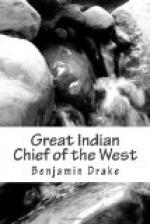and eating boiled corn but sparingly, in the evening.
In the winter of 1819-20, there was a disturbance between
the Sacs and Ioways, one of the latter having killed
a young man belonging to the former. Under the
agreement of a late council between these two tribes,
the old custom of appeasing the friends of one who
had been killed, by presents, had been abolished,
and each party had promised, that in future, the murderer
should be surrendered up, that he might be punished
with death. A party of Sacs, of which Black Hawk
was one, agreed to visit the Ioway village on this
occasion, and when about to depart, called at the
lodge of the young man who had committed the outrage,
to take him along. He was sick, but still ready
to accompany them. His brother interfered, and
insisted that he was too unwell to travel; that he
would himself go and die in his place, and finally
set off with the party. On the seventh day, they
reached the Ioway village. They dismounted a
short distance from it, and bid farewell to their young
brave, who went calmly forwards, alone, singing his
death-song, and seated himself in the middle of the
lodges. One of the Ioway chiefs went out to Black
Hawk, who told him the brother had come in the place
of the young man that had committed the murder, he
being sick. Black Hawk and his party, now mounted
their horses and set off on their return; and casting
their eyes towards the village, saw the Ioways, armed
with spears and clubs, gathering around the young prisoner.
At night the returning party, having stopped and kindled
a fire, were suddenly alarmed by the tramping of horses.
They immediately stood to their arms, but were soon
relieved, by finding, instead of a foe, their young
brave, unhurt and in the possession of two horses.
They ascertained that the Ioways, at first threatened
him with instant death, but finally, changing their
purpose, had given him something to eat, smoked the
pipe with him, and presenting him with two horses,
bid him return home in safety. The generous conduct
of the Ioways is deserving of praise, but the genuine
affection of this young brave, in nobly volunteering
to die in place of his sick brother, presents one of
those rare cases of self-devotion, which should be
held in remembrance.
In the following autumn, Black Hawk and some of his band went on a visit to their British father at Malden and received presents from him. A medal was given to Black Hawk for his fidelity to the British in the late war, and he was requested to come up annually, to that place, with his band, and receive such presents, as had been promised them by Colonel Dixon, when they joined the English forces. These visits were regularly made, it is believed, from that time down to the year 1832. It is owing to this circumstance that Black Hawk’s party has long been known by the appellation of the “British Band.”




